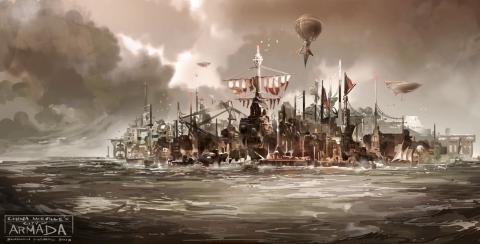My parents imposed a disarmament program, but the magazines stayed. Despite their lurid artwork and clunky prose, I fell in love with the ideas they dramatized. Science fiction and fantasy inspired me to write the same kind of pulp, and to keep at it until I'd published almost a dozen novels of my own.
Then science fiction and fantasy became industries; Tolkien rip-offs competed with novels of interstellar war based on the U.S. Navy in the Second World War. Star Wars and Star Trek became invasive species, turning the vast ecosystems of 1950s science fiction into dreary monocultures. Don't get me going about Game of Thrones.
I stopped writing science fiction and largely stopped reading it. Then economist and science fiction junkie Paul Krugman mentioned a British novelist named Charles Stross, a prolific writer of both science fiction and fantasy. Stross's extraordinary novels taught me that I was lucky to have got out of the business when I did, because I sure couldn't have competed with him.
One Stross series is about the Laundry, a British agency that's been dealing with tentacled monsters from other dimensions since the Second World War. His protagonist, Robert Howard (note the hommage to the author of Conan the Barbarian stories), deals with vampires and his own bureaucrats in The Rhesus Chart, his latest.
As a science fiction writer, Stross is a superb number-cruncher; his recent novel Neptune's Brood studies the shaky economics of interstellar colonization. In Stross's galaxy, Captain Kirk would boldly go only where the money was.
Giving Tolkien a heart attack
Then there's China Miéville, who writes far-left fantasy novels that would have shocked poor old Tolkien into cardiac arrest -- deliberately. The Ringwraiths of Middle Earth? Any number of critters in Miéville's Bas-Lag novels would eat them for breakfast.
For sheer surrealism, Miéville's The City and the City induces very strange feelings: it's a detective noir set in two eastern European cities that occupy the same space but refuse to accept each other's existence. Wallander would be on the next flight home to Sweden.
Stross and Miéville aren't the only ones worth reading. Genre literature has suffered from the onslaughts of online marketing, a horror that science fiction never foresaw. Yet some remarkable writers are out there, available both in ebooks and in hard copy.
Europe in Autumn, by Dave Hutchinson, shows us a near-future Europe that's given up on the E.U. and broken down into a mass of little countries with tight borders and fierce intelligence agencies. Rudi, an Estonian cook in a Polish restaurant, joins Les Coureurs du Bois, a shadowy organization that moves people and information across the new borders of a plausible (and appalling) new Europe.
Literally born again (and again)
The First Fifteen Lives of Harry August could launch a whole new genre: a mix of reincarnation, time travel and alternate history. Harry August is one of a small group of people who are literally born again: they go back to their own births when they die -- with all their memories. They can't directly change history, but Harry experiences lives as a physicist, spy, and millionaire investor. He and other immortal members of the Cronus Club must also deal with a fellow-immortal determined to destroy them all by building a godlike computer.
The author is Claire North, a pseudonym for British author Catherine Webb, who's written several other fantasy novels. She succeeds brilliantly at finding the voice of a man almost a thousand years old and exploring the implications of his lives. I look forward to Harry August's next fifteen.
The Martian by Andy Weir is a guilty pleasure: a dumb but enjoyable Robinson Crusoe story. A member of the first Mars expedition, Mark Watney, is presumed dead and abandoned when his colleagues must leave early to escape a violent windstorm. What follows is his first-person narrative of survival.
Watney is an engineering geek who runs the numbers for every problem he faces. Given his resources, how can he live as long as possible? His answers are both technically plausible and entertaining.
But both he and Weir are too fond of cheesy jokes and easy irony. A smartass like Watney would have been kicked out the airlock by his crewmates long before reaching Mars. Worse yet, Watney survives on Mars while totally failing to describe it -- even when he's driving far across its surface in search of survival. For a smart guy, he's not very observant.
Still, as a series of unexpected but believable problems, The Martian is a lot of fun. A movie is reportedly in the works; at least we'll be able to observe Mars for ourselves.
Apart from providing hours of happily wasted time, these novels are an encouraging sign that writers can still break into print with something interesting to say. (Weir's novel began as a free self-published ebook and was then picked up by a print publisher.)
Writers as diverse as Stross, Miéville, Hutchinson and Webb are all British writers, and taken together they're reminiscent of the Brit giants of the 1950s and even earlier: John Wyndham, Arthur C. Clarke, Olaf Stapledon, J.R.R. Tolkien, and even H. G. Wells himself -- each creating new genres and transforming old ones, rather than rehashing the same old stuff. That in itself should be vastly encouraging for readers, and even more so for aspiring writers.


Spread the word